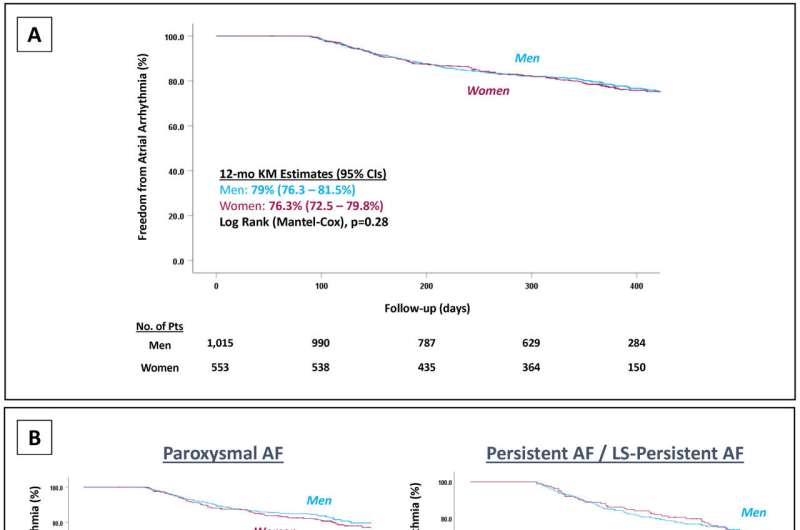This article has been reviewed according to Science X's editorial process and policies. Editors have highlighted the following attributes while ensuring the content's credibility:
fact-checked
peer-reviewed publication
trusted source
proofread
Study shows women with atrial fibrillation significantly benefit from pulsed field ablation procedures

Women with atrial fibrillation (AF) undergoing a procedure called pulsed field ablation (PFA) have just as good outcomes as men with AF undergoing the same procedure, according to a large-scale international study led by the Icahn School of Medicine at Mount Sinai.
This study is the first to compare sex outcomes for AF patients undergoing PFA, which is a new technology and the latest ablation modality that can be used to restore a regular heartbeat. The results also show PFA is safe and just as effective for men as for women. Findings were published October 5 in JAMA Cardiology.
"These results are important, as women are underrepresented in prior ablation studies and the results have been mixed with regards to both safety and effectiveness using conventional ablation strategies such as radiofrequency or cryoablation," says first author Mohit Turagam, MD, Associate Professor of Medicine (Cardiology) at Icahn Mount Sinai.
AF is an irregular heartbeat or heart rhythm disorder; 2.7 million Americans live with some form of it. Patients with AF can undergo a catheter procedure to treat this abnormal heart rhythm, called catheter ablation. This procedure involves making scars in small areas in the heart involved in the abnormal rhythm, which prevents abnormal electrical signals or rhythms from moving through the heart.
Two types of ablation are currently in common use: radiofrequency ablation, which uses heat energy to eliminate the problem area, and cryoablation, which uses cold energy. These ablation modalities are associated with increased risk of potential complications, including damage to the esophagus, pulmonary vein stenosis, and phrenic nerve injury.
PFA is a new type of ablation that does not use temperature, but instead short, high-energy electrical pulses that target mainly cardiac cells. This catheter procedure is more precise than radiofrequency and cryoablation, and does not cause damage to the esophagus, pulmonary veins, or phrenic nerve (which controls the diaphragm and is essential for breathing).
The researchers did a retrospective analysis of 1,568 patients from the Multi-National Survey on the Methods, Efficacy, and Safety on the Post-Approval Clinical Use of Pulsed Field Ablation (MANIFEST-PF). This is a large multinational registry from 24 European centers and includes patients who underwent their first-ever PFA for AF between March 2021 and May 2022 (after the device received regulatory approval in Europe).
The researchers categorized patients by sex and evaluated clinical outcomes of PFA within these groups. They studied the elimination of AF, and adverse events such as esophageal complications, pulmonary vein stenosis, phrenic nerve injury, pericardial tamponade (fluid accumulation in the heart), and vascular injury.
The results showed no significant difference in recurring atrial arrhythmia in men versus women. Specifically, 79% of men versus 76% of women did not have recurring atrial arrhythmia after PFA, a difference that was not statically significant. The rate of patients needing a second ablation were similar between sexes, with men at 8.3% versus women at 10%, also not statically significant.
Among the patients who underwent a second AF ablation, pulmonary vein isolation durability was significantly higher in women than in men (63% versus 37.8%), meaning they were less likely to have an additional ablation in their pulmonary veins. Complication rates from the procedure were low overall, and did not differ significantly by sex (women at 2.5% versus men at 1.5%).
"For the last few years, the emerging data with pulsed field energy has been quite promising for the treatment of atrial fibrillation. This current analysis of the large-scale MANIFEST-PF registry demonstrates that the benefits are not just limited to men; women derive the same level of success at one year, 76.3%, with a low complication rate of 2.5%. Thus, women should not be denied the beneficial, life-enhancing procedure of catheter ablation for atrial fibrillation," says senior author Vivek Reddy, MD, The Leona M. and Harry B. Helmsley Charitable Trust Professor of Medicine in Cardiac Electrophysiology at Icahn Mount Sinai.
More information: Clinical Outcomes by Sex After Pulsed Field Ablation of Atrial Fibrillation, JAMA Cardiology (2023).





















